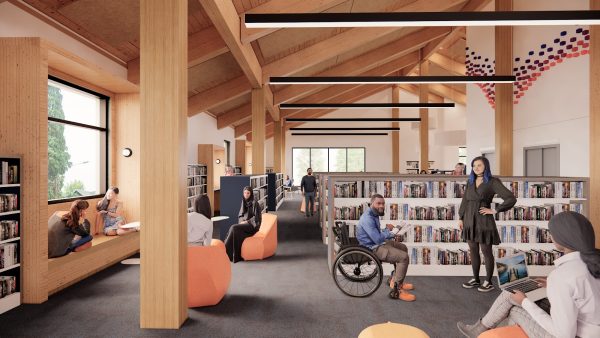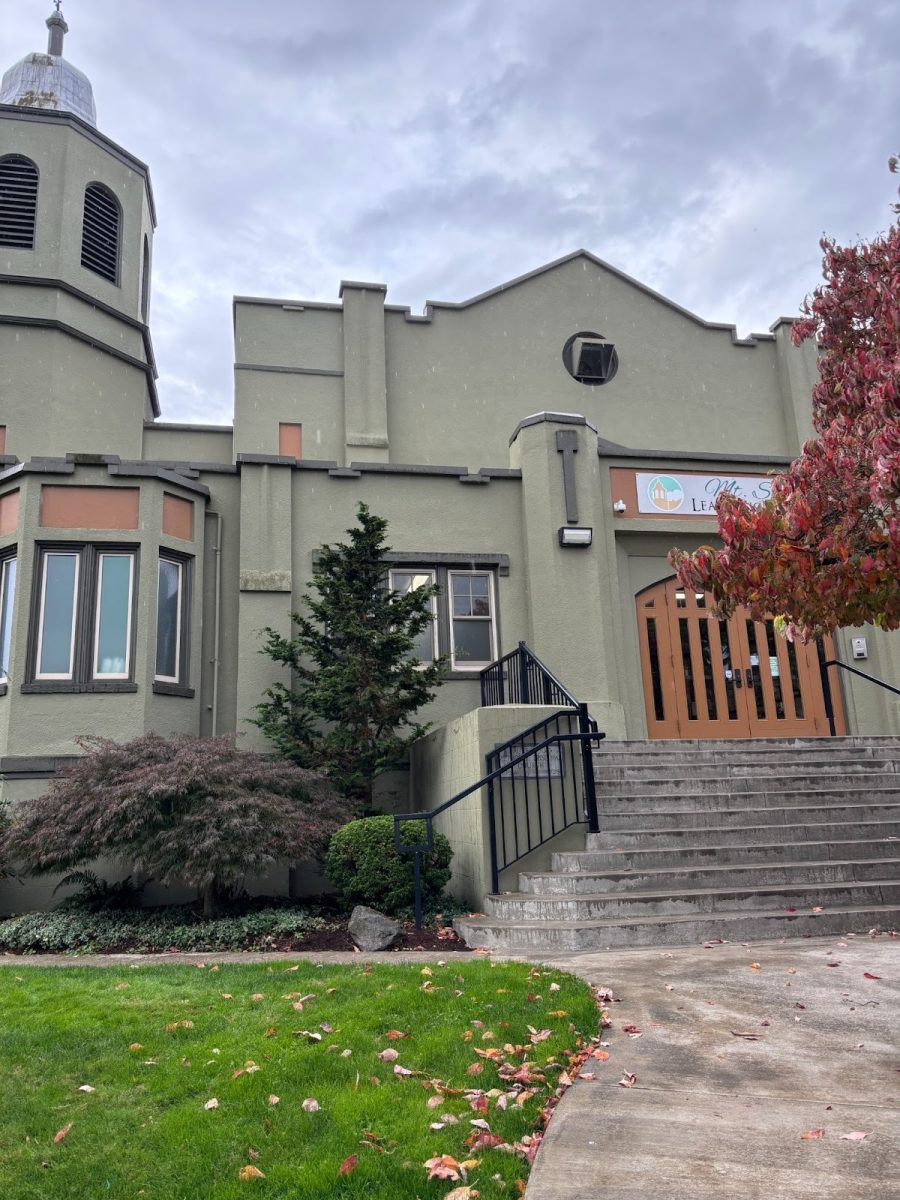
In a world that is expanding technology to encapsulate businesses, education, and even books, the role of the public library is also expanding. These expansions of library resources center them as vital parts of our communities. Beyond the act of checking out both physical and digital books, libraries aim to provide resources for what community members may be lacking — whether that is a need for free Wi-Fi for a job interview, a quiet place to study for your final exam, or a weekly storytime to entertain your toddler.
Where there is a need for access — for information, for literature, for technology, for quiet — libraries aim to serve. While not everyone is coming into the library from the same place, the goal for libraries is to give everyone access to the same resources inside its walls and among its digital resources. That is what they are at their core: places that promote equity. However, access to the in-person resources provided by libraries has often been limited by the availability of both amenities and space in aging buildings that no longer fit modern needs. As such, increasing space and accessibility encouraged the updating — and in some cases complete renovation — of all Multnomah County libraries.
These updates are able to happen due to the passing of Measure 26-211 in November of 2020. Multnomah County voters voted in favor of authorizing the county to issue $387 million in bonds to finance library renovations, revealing how important libraries are to local community members. “When Multnomah County voters voted yes on this bond, they really said, ‘We need more space and more modern spaces, so let’s [put money towards those updates],’” describes Liz Sauer, communications manager for Multnomah County Library’s Capital Building Projects.
Within our community of Southeast (SE) Portland, major reconstructions have focused on both the Holgate and Belmont libraries. The Holgate Library reopened this last summer after a complete reconstruction. The multi-year project turned the library into a new two-story building — triple its previous size — that not only provided much more space but also offered the modern amenities needed to truly serve all members of the community. Starting at the beginning of September, Belmont Library is closed to the public for its renovation.
A key focus for both of these SE library projects has been one thing: space. Sauer describes how despite Belmont Library being one of the busiest locations among Multnomah County’s libraries, it has “one of the smallest footprints.”
Bora Architecture and Interiors worked closely with Multnomah County and community members to redesign the Holgate Library, and they will be similarly working on Belmont Library’s renovation as well. Leslie Cliffe, project manager at Bora Architecture and Interiors, explains the negative effects of such a small building, like Belmont, being paired with such high numbers of community usage: “Currently there is so much hold shelving [at Belmont] that there is essentially no seating for patrons when they visit the branch.”
Luckily, the upcoming reconstruction, which is set to be complete in the spring of 2026, will leave the Belmont Library with more than double the square footage. The redesign will not only transform the original building into a children’s area, but will also add a completely new two-story structure with the added space; this is needed to not only check out books but also to provide spaces to study, utilize the computers and Wi-Fi, and simply enjoy oneself. Cliffe describes, “The new design aims to shift the [Belmont] Library’s role from a mere repository for books to a dynamic and inspiring space for people.”
To make the new building fit that criteria, Bora Architecture staff worked closely with not only Multnomah County but the surrounding community as well. This community outreach was done in multiple ways, from workshops to surveys that allowed community members to vote on how the library would be changed. One way these workshops and surveys reached the surrounding Belmont community was through community design advocates. Belmont Library administrator Gabe Giesige explains how these advocates “were members of the community that were paid to reach out to different parts of the surrounding Belmont communities.”
From meeting with Franklin students about what they would like to see in the new teen space, to keying in on how important it was to the community that the original Belmont Library building be preserved, this outreach allowed the reconstruction to be designed to truly serve the community.
Beyond increasing space, these library renovations are also focused on how to make these spaces more inclusive to all members of the community. This has been done through smaller changes such as specifically picking out “seating that is not only comfortable and durable but also addresses various body sizes and postures,” says Cliffe.
Larger structural changes have also been made to increase accessibility in the Multnomah County libraries. Sauer explains that some key changes at renovated Multnomah County libraries will ensure that “all of the ramps are extremely accessible for people using mobility devices.” Along with that change, Sauer adds, “New, lower shelf heights will [make it] much easier for folks with a variety of mobility needs and devices to navigate as well, since not everybody is able to reach up high for a massive shelf, and the larger shelf heights can be difficult to get around.”
All libraries with major updates, including both the Holgate and Belmont libraries, will also be renovated with all-user restrooms. From changes to bathrooms to the very chairs people can study in, Sauer explains these deliberate decisions are “so people with a variety of needs can feel safe, cared for, and have that accessibility [they need] inside the building.”
With all the goals set out for these reconstructions, they can take a while to be fully executed. Community members who utilize the Belmont Library have multiple options for where they can access library resources during reconstruction. A temporary location for checking out holds is open at 3557 SE Hawthorne Blvd. Due to Belmont being one of the busiest libraries in the county, this temporary location allows library patrons to utilize limited library resources at this nearby location, such as hold pickups, book returns, and free wireless printing.
If someone is looking for a place to truly access all the resources libraries can offer, the Holgate Library, also in the SE community, is newly renovated with many of the same key focuses of accessibility and community engagement.
Since its reopening this last summer, some new features include designated study rooms that anyone is free to reserve and utilize for a quiet space to work, community rooms that can be similarly reserved for events and meetings, large learning spaces for children and families, and much more.
Teens can also look to come to the Holgate Library for a space catered exclusively to teens, providing an environment for them to express themselves creatively, academically, and socially. “Holgate is the first library in Multnomah County that has a dedicated teen space,” explains Holgate Library’s Teen Librarian Maggie Nelson. “It’s really exciting because there aren’t a lot of places for teens to hang out that don’t require spending money.”
The Teen Room is equipped with two MacBook Computers with various creative and gaming software installed on them, art supplies, Nintendo Switches, and a TV. All of these aspects allow the area to truly be a space for teens to utilize in any way they want. The fact that the room has a door that can shut off the room from the rest of the library gives teens the freedom to be productive, have fun, or simply relax, and not have to worry about being too loud — even if they are technically in the library.
The excitement felt by the SE Portland community due to Holgate Library’s reopening has been immense. With a completely new building, the renovation allows any and all members of the community to enjoy the Holgate Library in ways that weren’t possible before — both due to available space and accessible amenities. Sauer describes, “[The newly renovated libraries] are becoming sort of new spaces with new realizations and new ways for people to explore and engage with other community members, with library staff, with what they need their library to be.”
Community members call for the Multnomah County libraries to not only stay accessible, but also to expand and increase their spaces and resources in order to do just that. A shift to digital media and resources does not pose a challenge to the relevance of libraries; instead, libraries are constantly adapting to provide what their communities need.
Libraries are vital for all communities to have, and these renovations are only the start of providing spaces for all members of these communities to be able to access and utilize their many resources. Sauer explains it: “This modern transformation keeps at its core what the library is needed for: equity. Whether it’s digital, or [through] reading a book, or going to enjoy storytime.”


































